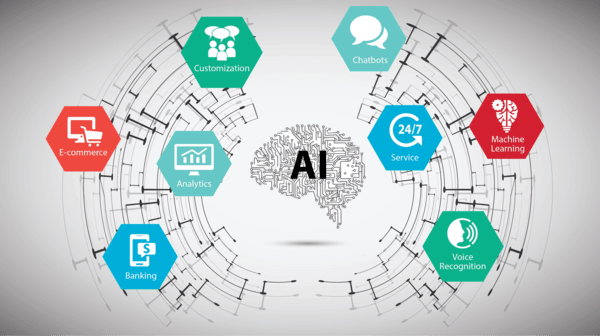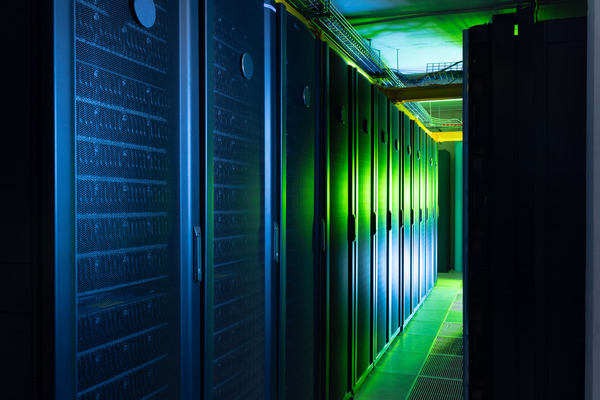
Cyber Security 10 Best Practices for the Small Healthcare Environment
October 30, 2019
Top 5 AI Development Tools in 2019
November 5, 2019Technological advancement has significantly transformed the role of data centers in modern business. The shift from simple communication methods to a world dependent on instant, online access underscores the evolution. Today, because the internet is everywhere and a good majority of people use smartphones, data centers play a key role in our lives. The introduction of custom silicon in public clouds starts a new era, setting apart the capabilities of modern data centers and underscoring their essential role in technology.
What Functions Do Data Centers Service in Today’s World?
Data centers are where computing facilities and networking equipment are located and centralized. They are tasked to collect, store, process, and distribute large amounts of data. Data centers have also been around since the dawn of the modern computing age.
They are also responsible for data backup and recovery, as well as networking. These centers also host websites, manage e-mails, and instant messaging services. They support cloud storage applications and e-commerce transactions. Even online gaming communities require data centers to manage their online activities.
Data centers connect communication networks so end-users can access information remotely. These vast numbers of clustered servers and related equipment can be found in a room or even in an entire compound.

How Have Data Centers Changed Over the Years?
Decades ago, early computers were massive machines that could occupy whole rooms. But as technology evolved, equipment shrunk and became cheaper than before. However, with this progress, data processing demands have also begun to increase exponentially.
Unlike before, where data centers are just one big supercomputer, modern aged data centers function using multiple servers to optimize further and boosts processing power. Now data centers consist of thousands of potent and tiny servers that run non-stop around the clock.
Why Is Custom Silicon a Game-Changer for Data Centers?
The introduction of custom silicon in cloud computing, highlighted by the 2024 advancements in cloud processors, is revolutionizing the landscape, offering a potential edge for those looking to deploy it. This shift highlights the continued comparison between private data centers and public clouds, pointing out how they differ in performance and efficiency.
Custom silicon, often utilizing ARM architecture, is engineered for specific tasks like AI, delivering superior performance, reduced costs, and greater sustainability. Giants such as Amazon, Microsoft, and Google lead this innovation, with Amazon’s Graviton processors exemplifying how custom hardware optimizes cloud services.
This trend potentially poses a challenge for private data centers to keep pace as custom silicon becomes synonymous with public cloud advancements. It marks a move toward not only more efficient computing but also more sustainable solutions, showcasing the industry’s shift toward greener technology.
Ultimately, the adoption of custom silicon, spearheaded by cloud vendors, is reshaping data center dynamics. It highlights the critical need for technological advancement to stay competitive. This makes the choice between private and public cloud infrastructures more nuanced as the benefits of custom silicon become increasingly apparent.
Why Are Data Centers Critical for Modern Businesses and Governments?
Almost every modern business and government office needs its very own data center, or they may opt to lease one. Big corporations and government institutions may choose to build and manage them in-house if they have the resources. While others choose to rent servers at colocation facilities. Some business owners also have the choice to use public cloud-based services.
Corporations that handle education, finance, telecommunication, retailers, and social networking services process tons of information every day. These businesses that produce and utilize data require data centers in running their operations. Without these centers, they will suffer the absence of speedy and secure access to data. This failure in delivering services will ultimately lead to the loss of clients and profits.
Now, we must remember that all of this information needs to be housed somewhere. Nowadays, cloud storage is gaining momentum, not just with business owners but with local consumers as well. The idea of running or storing our data and resources at home or work computers is getting replaced by off-shore storing mentality. Many firms are also migrating their professional applications to data center services to minimize the cost of running an in-house server.
That is why data centers are an indispensable resource for a business that wants to run their operation without worries. The importance of data centers in the modern world has increased ten-fold due to the rising demand of information trading.

How Do Data Centers Work?
Like how two computers are connected via a local network, Internet servers broadcast information to Web browsers using network connections. The data that is stored on a data center server is distributed into packets before transmission and is sent via routers that decide the most suitable path for that data to progress.
It then uses a series of wired and wireless networks to reach the user’s Internet service provider and finally arrive at the end user’s computer. Every time a Web address is keyed into a browser, it automatically requests information from a server. If the end-user wants to upload information, then the process will be reversed.
What Are the Different Types of Data Centers Available Today?
With how data centers are indispensable in running big corporations and with even small-medium enterprises joining the trend, choosing one to fit a business model is essential. There are different types of data centers and service models. Here are four main types of data centers:
Colocation Data Centers
Colocation data centers or most commonly known as “colo” is a company that rents space within a data center that they do not own and is housed outside the company’s premises. The colocation data center provides the infrastructure like the building itself, cooling, bandwidth, and security, among others. While the company produces and maintains the components, which include the servers, storage system, and security firewalls.
Enterprise Data Centers
Enterprise data centers are established, owned, and managed by companies. These data centers are operated under a single purpose and that this optimized service for their end-user clients. Enterprise data centers are often located inside corporate compounds.
Managed Services Data Centers
These data centers are operated by a third-party entity or a managed services provider instead of the company. The company rents the equipment and infrastructure to cut costs.
Cloud Data Centers
Cloud data centers are an off-premises form of a data center. The most common cloud hosting services are Amazon Web Services (AWS), Microsoft (Azure), and IBM Cloud.
What Makes a Data Center Facility Reliable?
Business owners are in constant need of reliability when in terms of maintaining a smooth operation. Good thing that a Data center is built to withstand a 24/7 service easily. However, the components require a significant amount of infrastructure support in both hardware and software areas.
These include power subsystems, stable and uninterruptible power supplies, proper ventilation, high-quality cooling systems, fire suppression, reliable backup generators, and connections to external networks.
The business world is moving at an incredibly fast pace that matches the overwhelming demand for information. With the ever-changing requirements of the modern business model, many companies place their confidence in data centers, as these facilities play a crucial role in reaching their IT specifications.
Data centers are more than just a safe and secure facility with space that is equipped with reliable power, and network. They are becoming a valuable addition to many businesses as they prove to be a dependable extension of their IT team. That is why data centers in modern business set up are increasingly becoming an indispensable factor for success.
How Will the Future of Data Centers Shape the Success of Businesses?
The significance of data centers in supporting the digital demands of modern business has evolved alongside technological advancements. Today, they not only serve as the infrastructure backbone for data management but also as a platform for innovation, particularly with the advent of custom silicon in public clouds. This evolution reflects the critical choice businesses face between leveraging public cloud services with cutting-edge technology or maintaining traditional private data centers. As the digital era progresses, the role of data centers, enhanced by technological breakthroughs like custom silicon, remains central to achieving success in a rapidly changing business environment.
